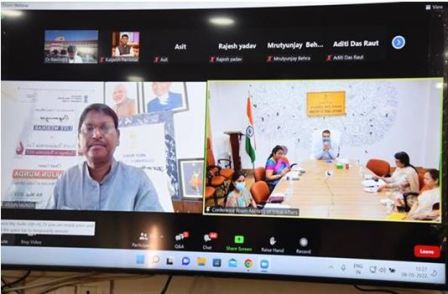Challenges in Thalassemia 2022
Need for nationwide awareness campaign through combined efforts of various government stakeholders to tackle Thalassemia: Shri Arjun Munda.
On World Thalassemia Day, Union Minister for Tribal Affairs Shri Arjun Munda virtually addressed the webinar “Challenges in Thalassemia 2022” in New Delhi today. Ministry of Tribal Affairs jointly organized it along with various ministries and the Thalassemia association. Experts from India and different parts of the world took part in the Conference.
the webinar “Challenges in Thalassemia 2022” in New Delhi today. Ministry of Tribal Affairs jointly organized it along with various ministries and the Thalassemia association. Experts from India and different parts of the world took part in the Conference.
On occasion, Shri Anil Kumar Jha Secretary, MoTA; Joint Secretary MoTA Shri Naval Jit Kapoor; Shri Rajesh Kumar Yadav, Joint Secretary, Department of Disability, also addressed the Webinar.
In his address, Union Minister Shri Arjun Munda said that as we celebrate Azadi Ka Amrit Mahotsav, the prime minister’s vision is to make new resolves that will propel India towards AtmaNirbhar Bharat during the period of Amrit Kaal. In this direction, we should also make new resolutions for tackling the problem of Thalassemia.
Shri Arjun Munda also said, “There is a need to have a nationwide awareness campaign through the stakeholders of various ministries and state governments such as Teachers- students, Anganwadi and ASHA workers, which is essential for mounting an attack on the problem of Thalassemia. He also said that a teacher should give five minutes extra to create awareness among students, and similarly, Anganwadi workers should inform the villagers about the disease and its prevention.
Union Minister also suggested that there should be common literature in local and straightforward language to guide the local level workers and help them create awareness.
“Apart from awareness and counselling, cheap medicines availability and Community blood donation should be promoted in rural areas”, the Minister urged.
In his address, Secretary, Ministry of Tribal Affairs, Shri Anil Kumar Jha, said that India could control, prevent, and treat the disease through awareness, effective participation, and a government approach.
He also said that the Ministry would support all private and public institutions working to control Thalassemia.
Also Read: A Curveball called Thalassemia
This program highlighted essential aspects of understanding Thalassemia followed by its education and awareness, including screening and management, by the key international experts and other partners like Thalassemia India and Thalassemia and Sickle Cell Society (TSCS) in association with Mumbai Hematology Group.
In India, Thalassemia and sickle cell anaemia are a considerable burden, with an estimated 100,000 patients with a β Thalassemia syndrome and around 150,0000 patients with sickle cell disease/trait. Still, few are optimally managed, and allogeneic stem cell transplant (BMT) is unaffordable for most families.
A key aspect of managing Thalassemia is to promote education and awareness, which is the key to success. Government and non-government organizations have worked towards this goal for the last 3 to 4 decades. Still, a nationwide collaborative effort regarding the above, reaching all rural regions where almost 70% of the population resides, is the need of the hour.
